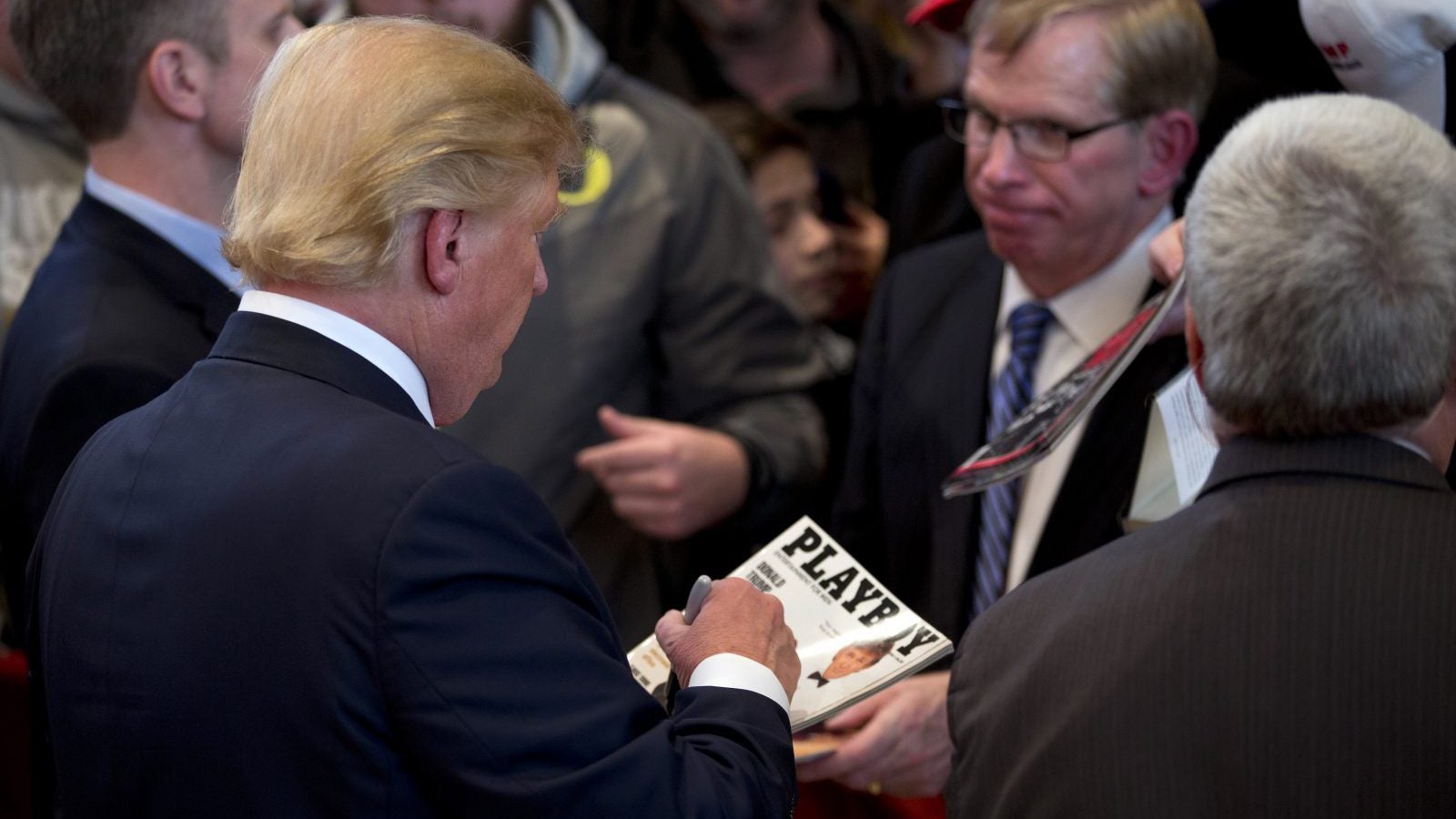Without Hugh Hefner, there would be no Donald Trump
It’s not hard to draw a straight line from the man who mainstreamed modern media’s objectification of women to the election of a US president who built his public persona on the same message.


It’s not hard to draw a straight line from the man who mainstreamed modern media’s objectification of women to the election of a US president who built his public persona on the same message.
With the launch of Playboy in 1953, Hugh Hefner moved pornography out of the illicit world of red-light districts and underground girlie mags and onto the brightly lit stage of American newsstands and suburban coffee tables. Hefner understood that celebrity sells, and found a way to put then-starlet Marilyn Monroe on Playboy’s first cover. He made a nude-calendar picture taken of her four years earlier his first centerfold. As a result, Eisenhower-era America felt the first stirrings of the sexual revolution to come.
Hefner later moved into TV, first with Playboy’s Penthouse and then Playboy After Dark, premiering in 1969 as a weekly mock cocktail party aiming to burnish the image he hoped to cultivate, that of a sophisticate. Nightspots called Playboy Clubs, appearing first across the US and later around the world, turned a wait staff of women in bustiers and bunny ears into an international trademark. The phenomenon would skew the psyches of generations of men and women.
Hefner’s Playboy can be legitimately credited with helping move discussion and consumption of sexual content into the light of day, with many of the positive outcomes that accompany the lifting of repressive inhibitions and official censorship. Still, there is one result even the most open-minded and libertine among us might find unforgivable.
The Trump-Hefner industrial complex
By the 1990s, Donald Trump had become a fixture in the fantasy world that Playboy relentlessly promoted. His transcribed words featured more than once in the magazine’s monthly centerpiece, The Playboy Interview. Trump even made it to the cover, alongside a Playmate, in 1990, a signature appearance he has never been shy about trumpeting. (He also appeared in soft-core Playboy Centerfold videos, though, mercifully, not in any sex scenes.)
In 2006, Trump rewarded one of the winning teams on The Apprentice with a trip to Hefner’s Los Angeles Playboy Mansion. As Surya Yalamanchili, a contestant on that team, wrote in Politico Magazine:
As a chauffeur opened the door on our limousine, we were greeted by Hefner’s three then-“girlfriends,” Kendra Wilkinson, Holly Madison and Bridget Marquardt, who were then costars on a reality show of their own. They ushered us inside. After a fireside chat with Hef, we headed to the backyard, where dozens of women—some wearing bikinis, others sporting bunny ears and bowties—surprised our team with a pool party.
Toward the end of the evening, I found myself in a small circle, conversing with Trump, Hefner and another contestant. With a wry smile, Trump looked at Hefner and said, “It’s hard for me to tell which of these girls are yours, and which ones are mine.” The women on my team were well-credentialed business executives, people Trump had supposedly hand-picked for their skills. In that moment, the only real difference to Trump between them and the scantily clad Playmates who were there for his entertainment was that some of the women were “his,” and some weren’t.
That sentiment was reinforced last October, when audio emerged of Trump bantering with Billy Bush in 2005 as they ogled a soap-opera performer:
Trump: Yeah, that’s her. With the gold. I better use some Tic Tacs just in case I start kissing her. You know, I’m automatically attracted to beautiful—I just start kissing them. It’s like a magnet. Just kiss. I don’t even wait. And when you’re a star, they let you do it. You can do anything.
Bush: Whatever you want.
Trump: Grab ’em by the pussy. You can do anything.
Here was a man straddling a sex-infused celebrity world that had anointed him with fame as much for his status as a philanderer and braggart as for the putative success of his businesses. Indeed, almost 63 million Americans, so many of whom had never lived in a world without Playboy or reality TV, were unbothered enough to still cast their vote for Trump in November.
A Hefner’s regrets
Months before the 2005 tape surfaced, Hefner had written a piece for Playboy titled “The Conservative Sex Movement”—since scrubbed from Playboy’s website, as Newsweek notes. Hefner cited Trump’s triumph over the likes of Ted Cruz in the 2016 presidential primaries as “proof of a sexual revolution in the Republican Party,” whose “voters nominated Donald Trump, a thrice-married New York entrepreneur who once owned the Miss USA pageant, over Cruz, the son of a pastor. It’s a sign of the massive changes in the ‘family values party.'”
It wasn’t an endorsement. Still, Hefner’s son Cooper, who this year took over management of the Playboy brand, made sure to note that he and his father did not support Trump as a political figure. “We don’t respect the guy,” Cooper told the Hollywood Reporter this summer. “There’s a personal embarrassment because Trump is somebody who has been on our cover.”
Well, we all make mistakes. But perhaps Hugh Hefner, who could be plausibly cast as an important voice in advocating for civil rights, free speech, and egalitarianism in his columns touting the “Playboy philosophy,” also gave us a pussy-grabbing world he never wanted.